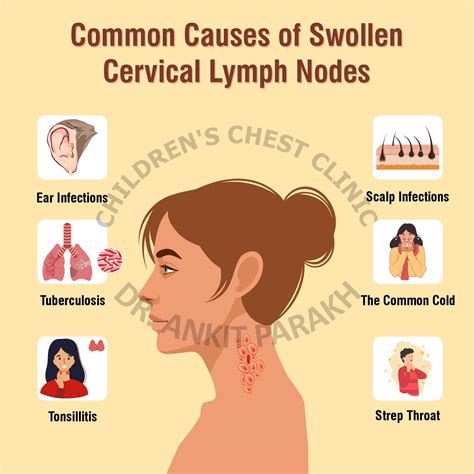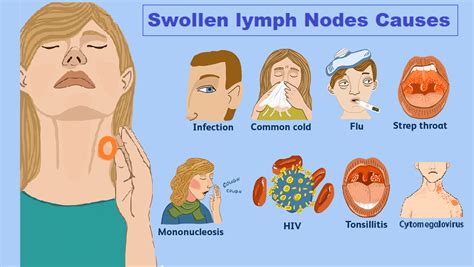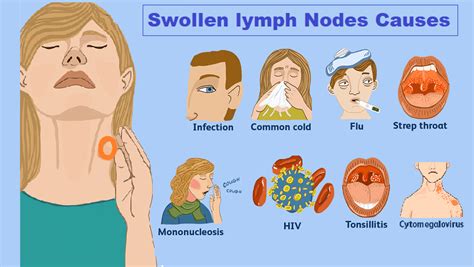Intro
Discover causes and treatments for swollen lymph nodes in neck, including infections, cancers, and autoimmune disorders, and learn about symptoms, diagnosis, and management options for neck lymphadenopathy.
The human body has a complex network of lymph nodes that play a crucial role in our immune system. These small, bean-shaped structures are responsible for filtering out harmful substances, such as bacteria, viruses, and other foreign particles, from our bloodstream. When our body detects an infection or inflammation, our lymph nodes can become swollen, which is a common symptom that can be alarming for many people. One of the most common areas where lymph nodes can become swollen is in the neck, a condition that can be caused by a variety of factors. In this article, we will delve into the world of swollen lymph nodes in the neck, exploring their causes, symptoms, diagnosis, and treatment options.
Swollen lymph nodes in the neck can be a sign of an underlying infection or disease, and it is essential to understand the possible causes of this condition. The neck is a common area where lymph nodes can become swollen due to its proximity to the throat and sinuses, making it prone to infections. Some of the most common causes of swollen lymph nodes in the neck include viral infections, such as the common cold or flu, bacterial infections, such as strep throat or tuberculosis, and other conditions like mononucleosis or lymphoma.
It is also important to note that swollen lymph nodes can be a symptom of a more serious underlying condition, such as cancer. However, in most cases, swollen lymph nodes are a normal response to an infection or inflammation, and they usually return to their normal size once the underlying condition has been treated. Understanding the causes and symptoms of swollen lymph nodes in the neck can help individuals seek medical attention if they experience any unusual or persistent symptoms.
Causes of Swollen Lymph Nodes in the Neck

The causes of swollen lymph nodes in the neck can be diverse, ranging from viral and bacterial infections to more serious conditions like cancer. Some of the most common causes of swollen lymph nodes in the neck include:
- Viral infections, such as the common cold or flu
- Bacterial infections, such as strep throat or tuberculosis
- Mononucleosis, a viral infection caused by the Epstein-Barr virus
- Lymphoma, a type of cancer that affects the immune system
- Other conditions, such as sinusitis or dental infections
It is essential to note that swollen lymph nodes can be a symptom of a more serious underlying condition, and individuals should seek medical attention if they experience any unusual or persistent symptoms.
Symptoms of Swollen Lymph Nodes in the Neck
The symptoms of swollen lymph nodes in the neck can vary depending on the underlying cause. Some common symptoms include: * Swelling or tenderness in the neck * Pain or discomfort in the neck or throat * Fever or chills * Sore throat or difficulty swallowing * Fatigue or weakness * Weight loss or loss of appetiteIndividuals may also experience other symptoms, such as a runny nose, cough, or headache, depending on the underlying cause of the swollen lymph nodes.
Diagnosis of Swollen Lymph Nodes in the Neck

Diagnosing swollen lymph nodes in the neck typically involves a physical examination and medical history. A doctor may perform a physical examination to check for any signs of infection or inflammation, such as redness, swelling, or tenderness in the neck. The doctor may also ask questions about the individual's medical history, including any recent illnesses or infections.
In some cases, the doctor may order additional tests, such as:
- Blood tests to check for infection or inflammation
- Imaging tests, such as a CT scan or MRI, to check for any abnormalities in the neck
- Biopsy, a procedure that involves removing a sample of tissue from the lymph node to check for cancer or other conditions
Treatment Options for Swollen Lymph Nodes in the Neck
The treatment options for swollen lymph nodes in the neck depend on the underlying cause. In most cases, treatment involves addressing the underlying infection or condition. Some common treatment options include: * Antibiotics to treat bacterial infections * Antiviral medications to treat viral infections * Pain relief medications to manage pain and discomfort * Surgery to remove the affected lymph node or to treat underlying conditions like cancerIn some cases, treatment may involve a combination of these options. It is essential to work with a healthcare provider to determine the best course of treatment for swollen lymph nodes in the neck.
Prevention of Swollen Lymph Nodes in the Neck

Preventing swollen lymph nodes in the neck involves practicing good hygiene and taking steps to prevent infections. Some tips for prevention include:
- Washing hands regularly to prevent the spread of infection
- Avoiding close contact with individuals who have infections
- Getting vaccinated against common infections like the flu
- Practicing good oral hygiene to prevent dental infections
- Avoiding smoking and secondhand smoke, which can increase the risk of infections
By taking these steps, individuals can reduce their risk of developing swollen lymph nodes in the neck.
Home Remedies for Swollen Lymph Nodes in the Neck
In addition to medical treatment, there are several home remedies that can help alleviate symptoms of swollen lymph nodes in the neck. Some common home remedies include: * Applying a warm compress to the affected area to reduce pain and discomfort * Drinking plenty of fluids to stay hydrated * Getting plenty of rest to help the body recover from infection * Using a humidifier to add moisture to the air and relieve congestion * Practicing stress-reducing techniques, such as meditation or deep breathing, to help manage stress and promote healingIt is essential to note that home remedies should not replace medical treatment. Individuals should work with a healthcare provider to determine the best course of treatment for swollen lymph nodes in the neck.
Complications of Swollen Lymph Nodes in the Neck

In some cases, swollen lymph nodes in the neck can lead to complications, such as:
- Abscesses, which are pockets of pus that can form in the affected lymph node
- Cellulitis, a bacterial infection that can cause redness, swelling, and pain in the skin
- Lymphoma, a type of cancer that can develop in the lymph nodes
- Sepsis, a life-threatening condition that occurs when the body's response to an infection becomes uncontrolled
It is essential to seek medical attention if symptoms persist or worsen over time.
When to Seek Medical Attention
Individuals should seek medical attention if they experience any of the following symptoms: * Severe pain or discomfort in the neck * Difficulty swallowing or breathing * Fever or chills * Swelling or tenderness in the neck that persists or worsens over time * Weight loss or loss of appetiteEarly diagnosis and treatment can help prevent complications and promote healing.
Conclusion and Next Steps

Swollen lymph nodes in the neck can be a symptom of an underlying infection or disease. Understanding the causes, symptoms, diagnosis, and treatment options can help individuals seek medical attention if they experience any unusual or persistent symptoms. By practicing good hygiene, getting vaccinated, and seeking medical attention when necessary, individuals can reduce their risk of developing swollen lymph nodes in the neck.
We hope this article has provided you with a comprehensive understanding of swollen lymph nodes in the neck. If you have any questions or concerns, please do not hesitate to reach out to a healthcare provider. Remember to share this article with friends and family to help promote awareness and education about this important topic.
What are the common causes of swollen lymph nodes in the neck?
+Common causes of swollen lymph nodes in the neck include viral infections, bacterial infections, mononucleosis, lymphoma, and other conditions like sinusitis or dental infections.
How are swollen lymph nodes in the neck diagnosed?
+Diagnosing swollen lymph nodes in the neck typically involves a physical examination and medical history. A doctor may also order additional tests, such as blood tests, imaging tests, or biopsy.
What are the treatment options for swollen lymph nodes in the neck?
+Treatment options for swollen lymph nodes in the neck depend on the underlying cause and may include antibiotics, antiviral medications, pain relief medications, or surgery.
Can swollen lymph nodes in the neck be prevented?
+Yes, swollen lymph nodes in the neck can be prevented by practicing good hygiene, getting vaccinated, and avoiding close contact with individuals who have infections.
What are the complications of swollen lymph nodes in the neck?
+Complications of swollen lymph nodes in the neck can include abscesses, cellulitis, lymphoma, and sepsis. It is essential to seek medical attention if symptoms persist or worsen over time.
